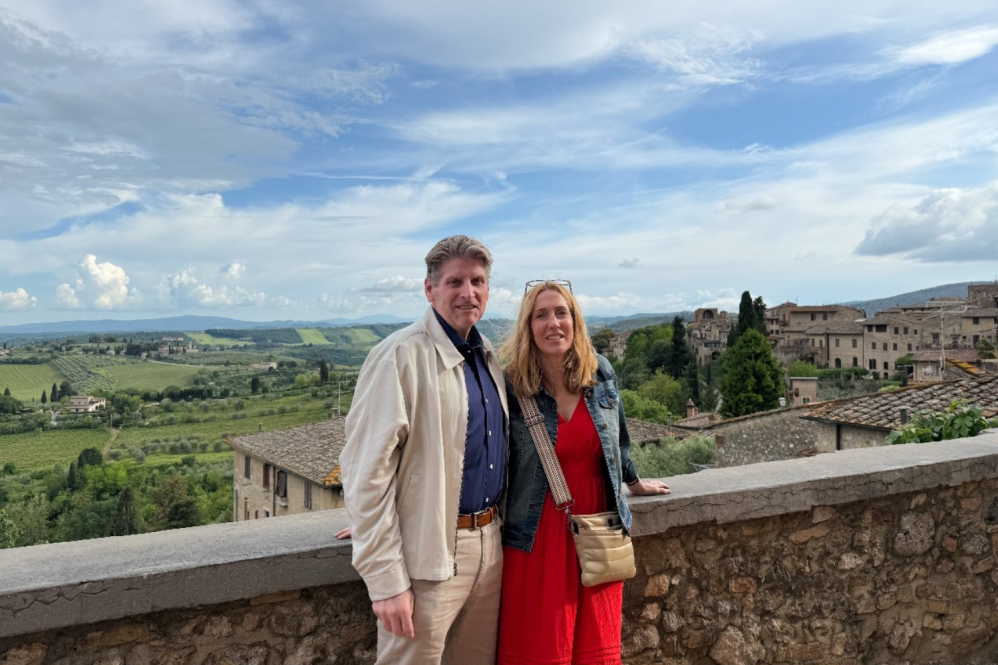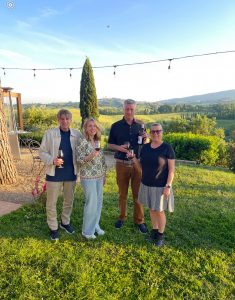When Jay Buth was diagnosed with pancreatic cancer, he braced for the fight of his life. He's learned over the past three years, healing isn't just physical, it's mental, emotional, and deeply personal. This is the story of survival, resilience, and the power of whole-person care.

Jay Buth and his wife Alissa on a recent trip to Italy.
Three years ago, Jay Buth was preparing for surgery to remove a tumor from his pancreas. Today, he's returning from a bucket-list trip to Italy. But the road between those milestones was neither simple nor smooth.
After a successful surgery to remove the tumor, described by his doctors as "better than textbook," Buth faced unexpected complications that left him in the ICU for two months. From there, he was transferred to the Hospital for Special Care in New Britain, where he had to relearn how to walk and regain basic coordination. But the harder recovery, he says, was the mental one.
"I think mental health doesn't get enough attention during cancer treatment," Buth explains. "But even more so, it's overlooked after treatment ends. That's when a lot of the mental healing really begins."
Over the past three years, Jay has worked closely with Dr. Judith Cooney, a clinical psychologist and associate professor of psychiatry at the Carol and Ray Neag Comprehensive Cancer Center at UConn Health, to help navigate the emotional and psychological aftermath of surviving cancer.
Cooney specializes in helping patients and survivors manage the emotional impact of cancer diagnoses, treatment, and survivorship.
Her work includes evidence-based interventions for anxiety, depression, adjustment difficulties, and coping strategies related to chronic and terminal illness. Cooney partners with oncologists and the wider care team to ensure patients receive whole-person care, supporting both the physical and psychological challenges that come with cancer.
"Mental health is not separate from cancer care," says Dr. Cooney. "It's essential to supporting patients' resilience, quality of life, and ability to heal, both during and after treatment."
"One of the most powerful, and often unexpected, challenges survivors face is survivor's guilt," said Dr. Cooney. "They ask, 'Why did I survive when others didn't?' These are very real, very human reactions,and they deserve just as much care and attention as the physical aspects of recovery."
Buth says that question haunted him after he was declared cancer-free. "When you get the all-clear, you expect to feel nothing but relief," he said. "But for me, there was this incredible guilt. Why did I make it when others didn't?"
Through his work with Dr. Cooney, he's reframed that guilt as something more constructive.
"We talked a lot about shifting from 'Why me?' to 'Why not me?'" Cooney said. "Jay's treatment responded well. His tumor was operable. His body healed. These are blessings, not sources of guilt."
Together, they've worked through scan-related anxiety, the stress of long-term monitoring, and the daily effort to stay grounded.
"We focus on mindfulness, breathing, staying present, and viewing follow-up scans as routine medical care, not as looming threats," said Cooney. "Jay has done an incredible job learning how to take in the data, stay rooted in the moment, and not let fear drive the narrative."
Their sessions began every other week and now take place monthly or as needed.

Buth describes his emotional recovery as ongoing, but transformative. "This might sound strange, but cancer might've been the best thing that ever happened to me," he said. "It forced me to slow down, notice the small things and helped me live more fully."
That empathy has turned into action. Quietly and consistently, Jay now supports other pancreatic cancer patients. "I don't know how helpful I am," he says. "But sometimes people just need someone who's been there. Someone who will listen."
"That peer support is incredibly meaningful," Cooney added. "Jay's willingness to use his experience to help others is not only a testament to his strength, but a vital part of healing. Helping others can also help us find purpose in our own journeys."
As he returns from his trip to Rome, Florence, and the Amalfi Coast with his wife, Jay carried with him not just a passport, but a new perspective.
"You only go once around the ride," he said. "So we're doing it. We're living it."
This June, during National Cancer Survivor Month, Jay's story reminds us that survival is about more than medicine. It's about healing the whole person, body, mind, and spirit-and the role expert mental health support plays long after the last scan.
"Mental health is health care," Jay says. "And it should be part of every cancer care plan, from day one and long after."






